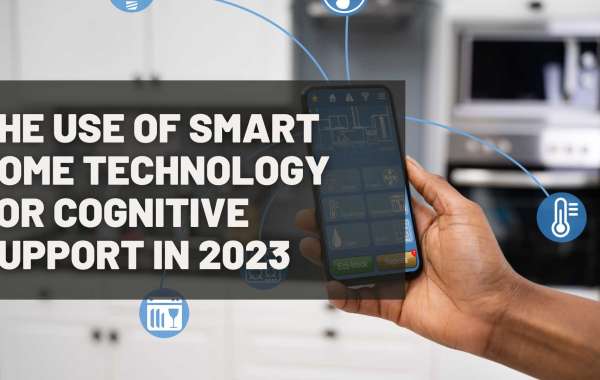We do live in a technological age. People diagnosed with cognitive impairment disease or other types of dementia can take full advantage of the smart home technology that has been provided and continues to provide. With these assisted-living technologies, life is much easier for people with determination or cognitive impairment. It can support you and your family to live with optimal independence.
Smart home devices can connect to a central hub that is wired or wireless, and all can be controlled from there. Examples of smart home technology include smart thermostats, locks, lighting, and appliances. The goal of smart home technology is to provide homeowners with greater convenience, energy efficiency, and security.
What is a smart home?
A smart home is a residence equipped with smart home technology that enables automation and remote control of various home systems and devices, such as lighting, heating and cooling, appliances, security, and entertainment.
Smart home devices can seem magical at times. This technology enables you to turn on the lights without touching a switch, unlock your front door from the comfort of your bedroom (or hotel room), and adjust your thermostat using simple voice commands.
For many, these abilities are a commodity or a luxury. But for those in an accessible environment, smart home technology can be a powerful enabler to live more independent and empowered lives.
Smart home devices are increasingly becoming more sophisticated and powerful. The latest models are equipped with features such as sending notifications when activated, providing remote access control, and integrating with other devices to control them partially or completely hands-free. Smart devices are designed to make life easier by performing tedious tasks like turning on lights or adjusting the thermostat from anywhere in the world.
They can also activate other smart home gadgets like security cameras, audio systems, door locks, and much more. By offering greater flexibility and convenience, smart home devices have revolutionized how people interact with their living spaces. All smart devices require a smartphone and app to set up, but the process is usually simple. Generally, it doesn't matter whether you have an Apple or Android phone - most devices will work.
However, minimum requirements may limit your device's or its software's useful life. (Of the devices in this guide, some are compatible with older software, such as iOS 9.0 or Android 4.0; others require iOS 13.2 or Android 8.0.) Also, some users will need some guidance or assistance setting up or maintaining their smart devices. As far as we know, no national organizations currently offer such services, although there are local options, which we discuss in the Installation and Maintenance section.
Unfortunately, there's no single, smart home solution either. Instead, the type of equipment you should choose depends on your needs. This can be as basic as turning lights on and off daily. It can be as comprehensive as having a home with smart sensors, security devices, and fully automated appliances or it could be someplace in between.
How smart can home technology benefit people with cognitive impairment?
Smart home devices offer a combination of lighting, music, and temperature control. These devices communicate quickly with multiple smart home assistants simultaneously. This technology is no longer just in sci-fi movies; it is a reality today and can be installed cheaply, even by people with little technical knowledge. Some specific ways that smart home technology can benefit people with disabilities include:
Improved accessibility: Smart home features such as voice-controlled doors and appliances can make it more manageable for people with cognitive impairment to navigate their homes and perform everyday duties.
Autonomy: Smart home technology can make it effortless for people with disabilities or cognitive impairment to manage their residences and perform duties independently rather than relying on the help of others.
Safety and Security: Smart home devices such as smart smoke and carbon monoxide detectors can alert paramedics or first responders in a medical emergency. Smart home technology can also help avert mishaps or falls by providing reminders or alarms for tasks like taking medication.
Quality of Life: Smart home technology can make everyday life more comfortable and convenient for those with cognitive impairment and for people of determination by automating various tasks, such as adjusting the temperature or turning on lights. Video conferencing allows those with disabilities to interact more easily with family and friends, improving communication and socialization.
Who Can Benefit From a Smart Home?
People with learning disabilities.
For the elderly and those with hearing, visual, speech, language, or mobility impairments, as well as those with special needs such as dyslexia, learning disabilities, ADHD, and autism, building a smart home will enhance their independence and provide your Daily life empowerment.
Hearing Impaired
You can participate in conversations using smart communication assistive technology tools. Smart technology can benefit anyone, whether they are deaf or hard of hearing or not. This smart tech has the different features we mentioned, so it's easy to see how smart TVs can be more beneficial than regular TVs.
People with Reduced Mobility
Provide self-sufficiency and achieve independence through smart home automation and personalization using voice control and wearable devices. Additionally, some devices may communicate with healthcare providers via biomedical information.
According to the Centers for Disease Control, 61 million adults in the United States have a disability. Efficient, comfortable, and assisted living for the elderly and disabled is no longer a dream but a reality.
Smart Home Offers Better Quality of Life
Smart homes can provide a better quality of life for people with cognitive impairment and older adults in several ways:
Task automation:
Smart home technology can simplify everyday tasks and routines by automating tasks. A smart thermostat can intelligently adjust the temperature based on the time of day or a user's schedule. A smart lighting system can be set to turn on and off at specific times or when someone enters or leaves a room. This is great for living and especially useful for people with learning disabilities or memory difficulties, as it helps them remember to do tasks or stick to a routine.
Provide reminders and alerts:
Smart home devices can offer reminders for essential tasks like taking medication, completing errands, and scheduling appointments. This can benefit people with learning disabilities or memory issues as it helps them stay organized and informed.
Enhanced security:
Smart home technology can increase home safety by sending alerts in emergencies such as fires or carbon monoxide leaks. It can also sound an alarm if there is unusual activity or movement in the home, which is useful for older adults who may be more prone to falls or accidents.
Improve social and communication:
Smart home technology can enhance communication for individuals with learning disabilities, determination, or older age groups through video-conferencing, social media, and other platforms. For example, a smart speaker with a virtual assistant can make calls or send messages, or a smart TV can be used to video chat with other people.
Final Thoughts
Smart home technology can significantly improve the independence and quality of life of people with disabilities. You can use your smartphone, tablet, computer, or voice-activated device to help them manage everyday tasks and home systems such as lighting, temperature, and security. The technology is designed to support people with disabilities and caregivers, making everyday life easier and more convenient.
Smart home technology can empower people with cognitive impairment, enabling them to lead more fulfilling and independent lives.








